Module 1 Lost and found Unit 2 Are they yours 课件(共31张PPT)
文档属性
| 名称 | Module 1 Lost and found Unit 2 Are they yours 课件(共31张PPT) |

|
|
| 格式 | ppt | ||
| 文件大小 | 11.3MB | ||
| 资源类型 | 教案 | ||
| 版本资源 | 外研版 | ||
| 科目 | 英语 | ||
| 更新时间 | 2022-04-10 09:56:35 | ||
图片预览

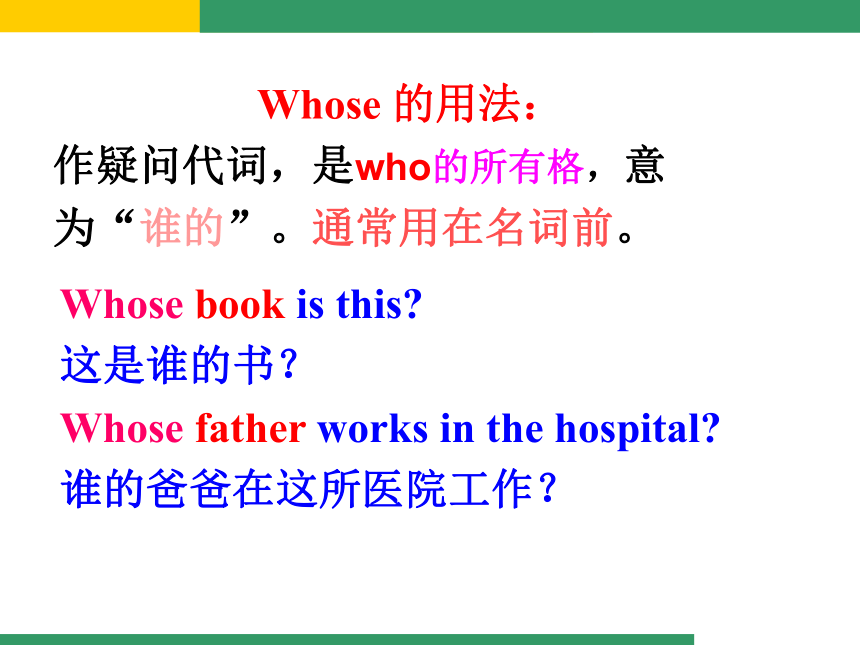
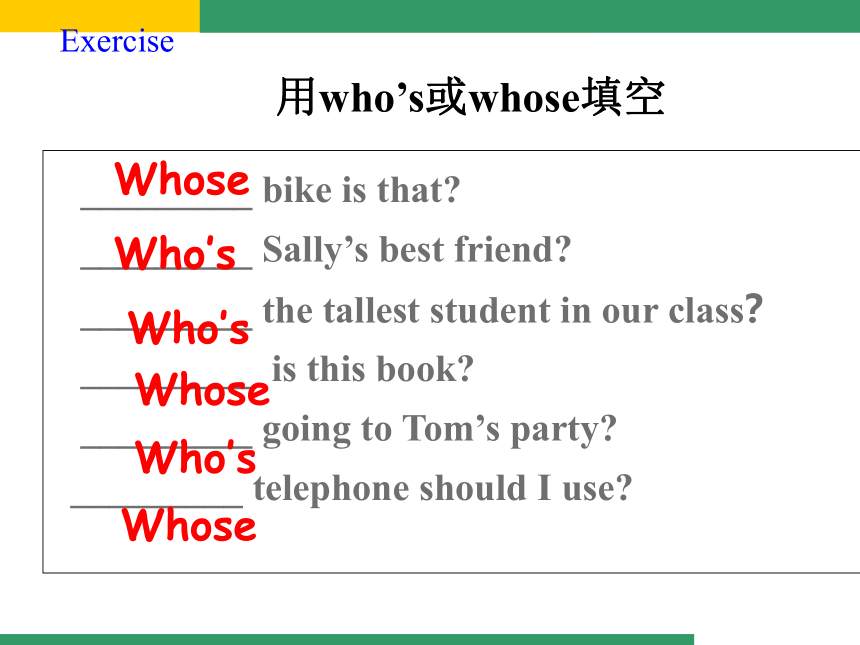
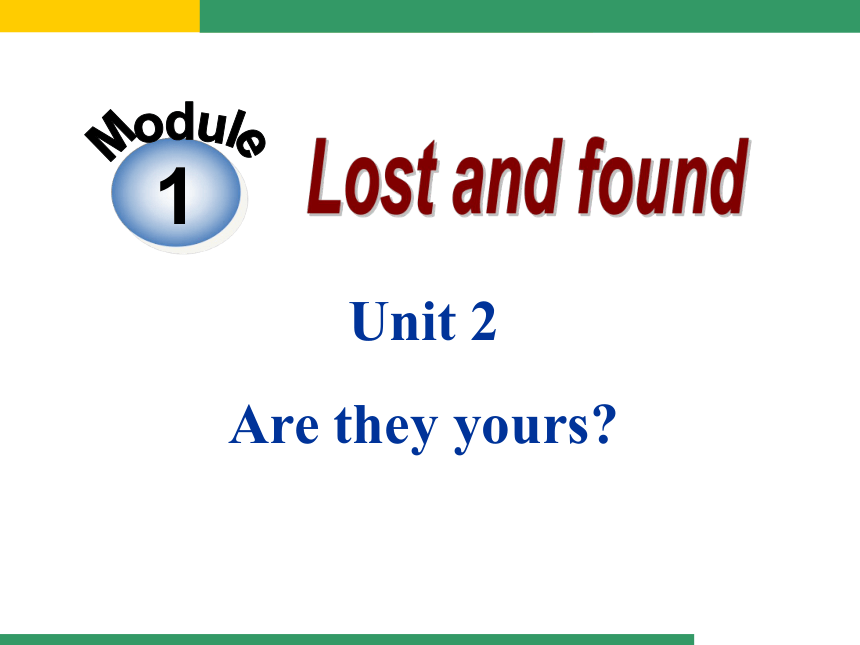

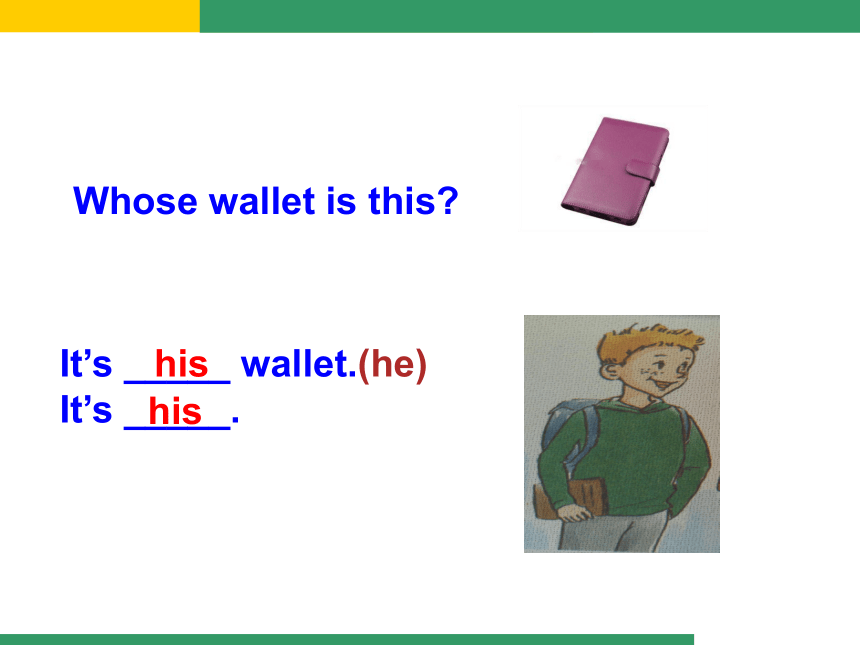
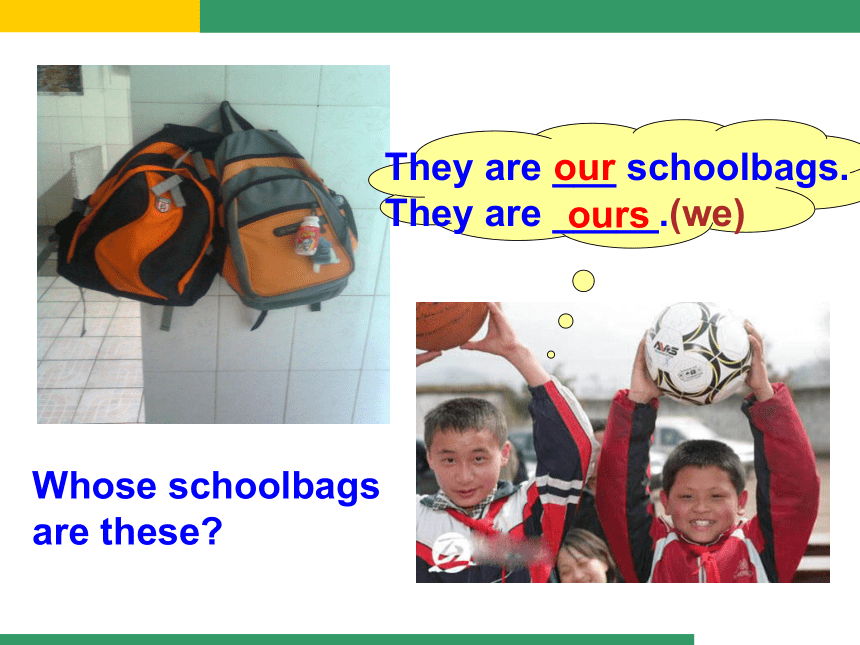
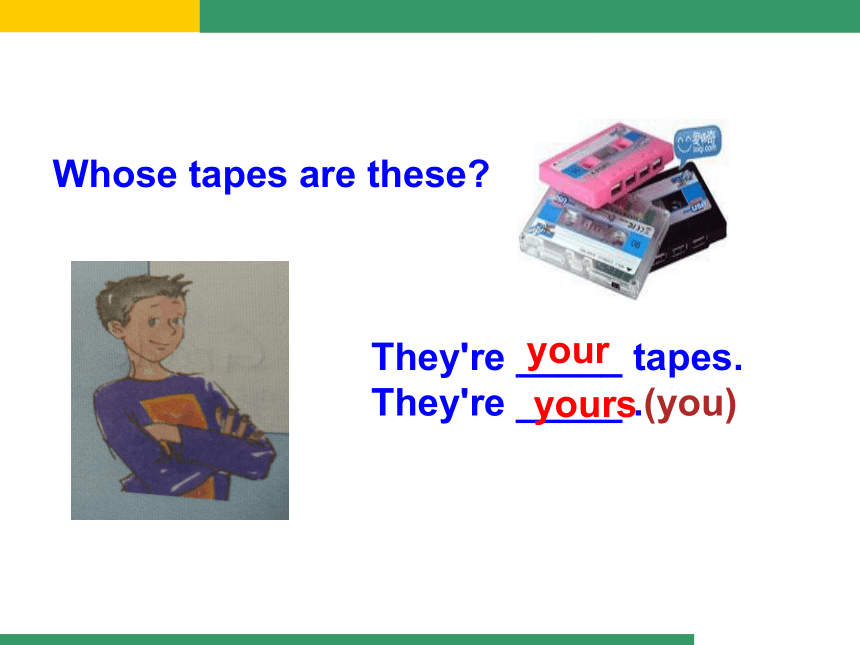
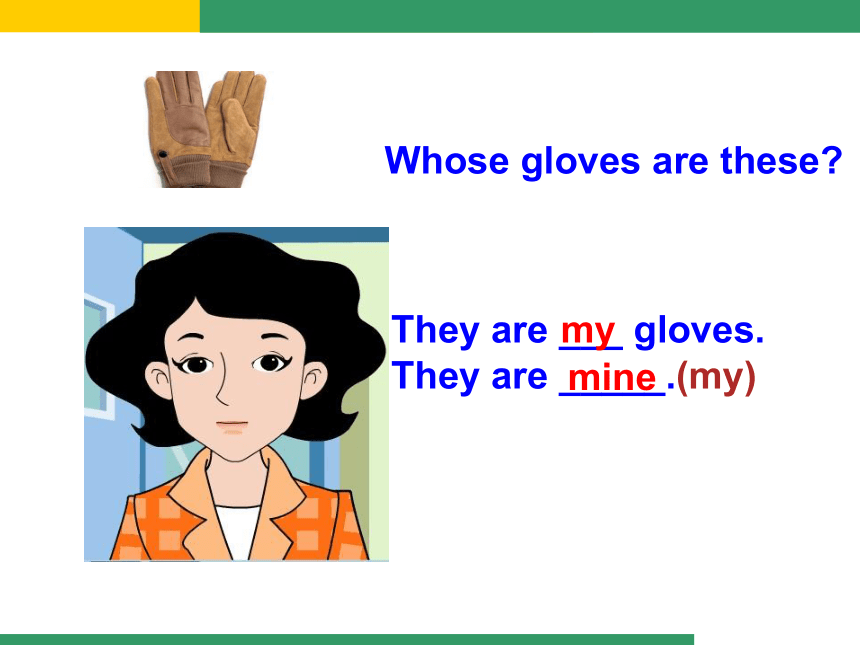
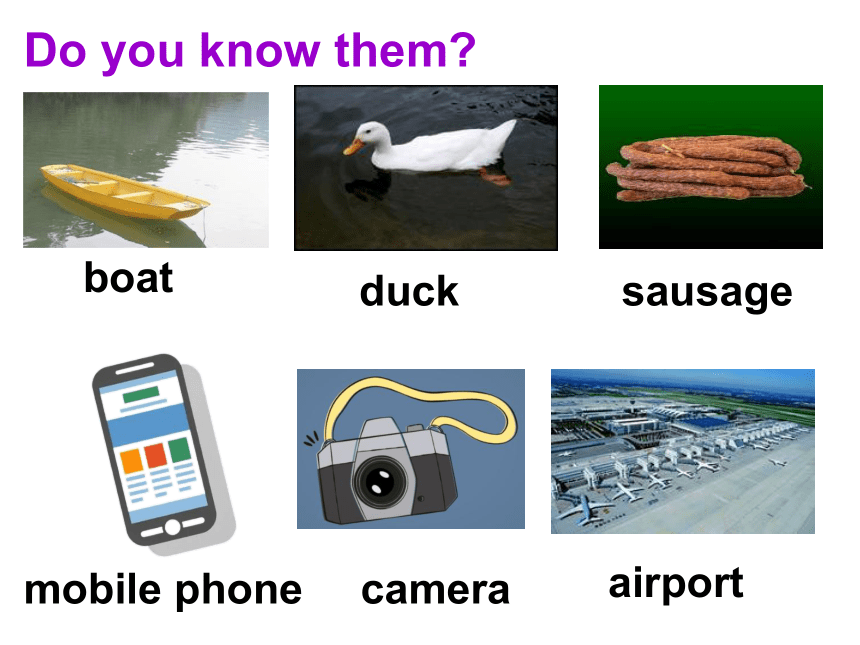
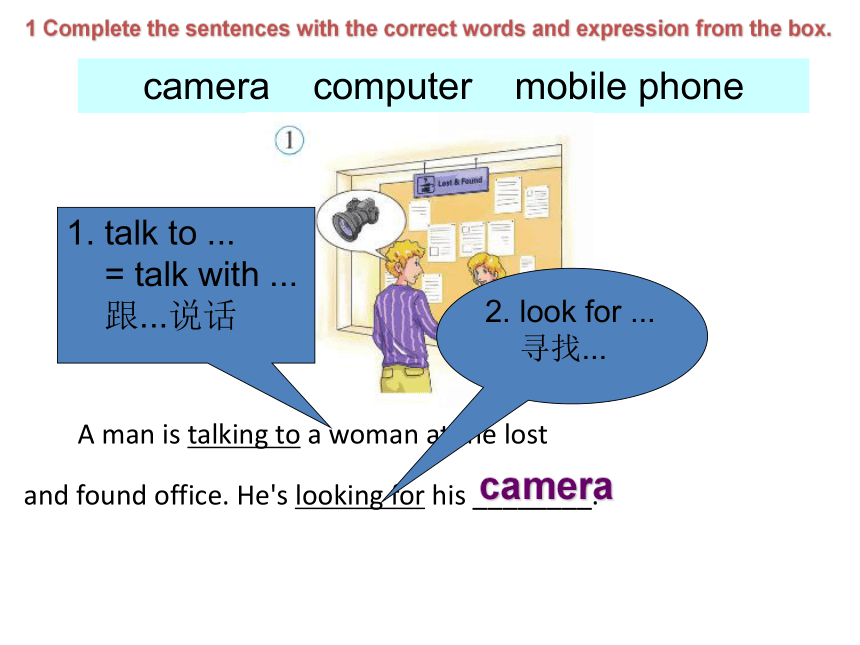
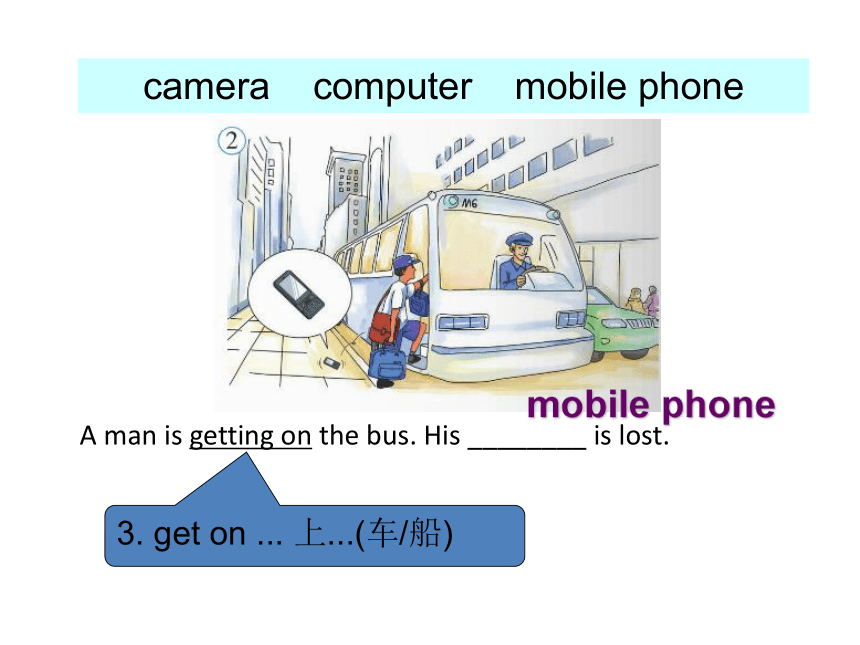
文档简介
(共31张PPT)
Whose 的用法:
作疑问代词,是who的所有格,意为“谁的”。通常用在名词前。
Whose book is this
这是谁的书?
Whose father works in the hospital
谁的爸爸在这所医院工作?
Exercise
_________ bike is that
_________ Sally’s best friend
_________ the tallest student in our class?
_________ is this book
_________ going to Tom’s party
_________ telephone should I use
Whose
Who’s
用who’s或whose填空
Whose
Whose
Who’s
Who’s
1
Unit 2
Are they yours
Whose watch is this
It’s ____ watch.(she)
It’s _____.
her
hers
Whose wallet is this
It’s _____ wallet.(he)
It’s _____.
his
his
Whose schoolbags
are these
They are ___ schoolbags.
They are _____.(we)
our
ours
Whose tapes are these
They're _____ tapes.
They're _____ .(you)
your
yours
Whose gloves are these
They are ___ gloves.
They are _____.(my)
my
mine
Do you know them
boat
duck
sausage
mobile phone
camera
airport
A man is talking to a woman at the lost
and found office. He's looking for his ________.
1 Complete the sentences with the correct words and expression from the box.
camera computer mobile phone
camera
1. talk to ...
= talk with ...
跟...说话
2. look for ...
寻找...
A man is getting on the bus. His ________ is lost.
camera computer mobile phone
mobile phone
3. get on ... 上...(车/船)
Lost and found office
Skim (while-reading)
Read the title of the passage aloud.
1. What's the passage about
2. Guess: Is the lost and found office big or small
The New York Lost and Found Office.
It's big.
Read the passage and answer the questions.
When do people often lose things
Why are these lost and found offices
at airports and stations
3. What do people do at the lost and found office
4. What strange things are there at the New York
City Lost and Found Office
1. When do people often lose things
__________________________________________
2. Why are these lost and found offices
at airports and stations
__________________________________________
______________________________________
When they are travelling or when they’re in a hurry.
Because people often leave things on planes,
on trains, on buses and in taxis.
3. What do people do at the lost and found office
__________________________________________
4. What strange things are there at the New York
City Lost and Found Office
__________________________________________
_________________________________
They look for things they have lost.
A large boat, three dogs, two ducks, a pig
and fifteen kilos of sausages.
Welcome to the New York City Lost and Found Office. People often lose things when they're travelling or when they're in a hurry. They leave things on planes, on trains, on buses and in taxis. That's why there are lost and found offices at airports and stations.
4. be in a hurry 匆匆忙忙
5. “leave 某物 某地”
把某物遗忘在某地
6. 那就是为什么...
The New York City Lost and Found Office is very big. Hundreds of people come here every day. They are looking for their phones, cameras, watches, computers and many other things. We usually have about two thousand mobile phones and one thousand cameras.
7. 成百的...
8. 许多其他的东西
9. 大约
At the moment, there are also some strange things at the New York and Found Office. There are about a hundred bikes and a large boat. There are also a lot of animals.
10. 此刻
This week, there are three dogs, two ducks and a pig! Whose are they Are they yours We don't know! Are you looking for fifteen kilos of sausages They're here too!
11. a kilo of ...
一公斤...
Read the passage carefully and try to find these phrases.
欢迎来到...
丢东西
匆匆忙忙
把...落/ 掉在飞机上
把...落在出租车上
在机场和车站
几百;成百上千
寻找
许多其他的东西
2000块手机
奇怪的东西
此刻
十五公斤的...
welcome to...
lose things
in a hurry
leave ... on planes
leave ... in taxis
at airports and stations
hundreds of
look for...
many other things
two thousand mobile phones
strange things
at this moment
fifteen kilos of...
in a hurry 意思是“匆匆忙忙”。
1. People often lose things when they’re travelling or when they’re in a hurry. 人们在旅行中或是匆忙中经常丢东西。
She write a letter in a hurry.
She’s in no hurry to leave here.
that’s why 表示“是……的原因”,常用于句首,后面跟的是结果。如:
2. That’s why there are lost and found
offices at airports and stations.
这就是在机场和火车站有失物招领办公室的原因。
I get up at 9:00 this morning.
That’s why I’m late.
3. Hundreds of people come here every day.
每天都有成百上千人到这里来。
hundred是一个确数, 表示“一百”。当hundred前面有具体数字时, 要用单数形式, 但它后面跟of 时, 要用复数形式hundreds of,同时其前面不能再加具体数字。△thousand, million也有此类似的用法。
There are hundreds of mobile phones in the store.
两千:two thousand
Writing – read the lost and found notes and write.
Lost
My gloves.
They’re blue and
white. Call Tony at
8574 9326.
Found
Is this your bag
Call Betty at 2369
0390.
根据所给提示, 完成下面的招领启事和寻物启事。
Found:
Is this
Please
Bob.
捡到一些蜡笔,失者可打电话425-6801找Bob.
Phone #
some crayons
yours
call
425-6801
今丢失一些书,有拾到者可打电话695-3059与David联系。
Lost:
My .
My
Please
is David.
695-3059.
books
name
call
堂堂清
1.我通常起床很晚,所以我经常匆忙去上学。
I usually get up late, so I often go to
school ________ ________ ________.
2.人们把他们的东西忘在飞机上、公共汽车上和出租车上。
People ________ their things on ________, on buses and in ________.
3. 成百上千的人们来到这里。
_______ _______ people come here.
4.这就是我努力工作的原因
________ ________ I work so hard.
in a hurry
leave
planes
taxis
Hundreds of
That’s why
1) 每人按要求制作一幅“物主代词卡”。
要求:
①规格:10cm×5cm。
②正面是汉语,反面用英语写出对应的名词性
物主代词和形容词性物主代词。
③两人一组互相看卡片,说出(或读出)与之相对
应的汉语或英语。
2) 三人一组,应用物主代词编写对话并表演。
Whose 的用法:
作疑问代词,是who的所有格,意为“谁的”。通常用在名词前。
Whose book is this
这是谁的书?
Whose father works in the hospital
谁的爸爸在这所医院工作?
Exercise
_________ bike is that
_________ Sally’s best friend
_________ the tallest student in our class?
_________ is this book
_________ going to Tom’s party
_________ telephone should I use
Whose
Who’s
用who’s或whose填空
Whose
Whose
Who’s
Who’s
1
Unit 2
Are they yours
Whose watch is this
It’s ____ watch.(she)
It’s _____.
her
hers
Whose wallet is this
It’s _____ wallet.(he)
It’s _____.
his
his
Whose schoolbags
are these
They are ___ schoolbags.
They are _____.(we)
our
ours
Whose tapes are these
They're _____ tapes.
They're _____ .(you)
your
yours
Whose gloves are these
They are ___ gloves.
They are _____.(my)
my
mine
Do you know them
boat
duck
sausage
mobile phone
camera
airport
A man is talking to a woman at the lost
and found office. He's looking for his ________.
1 Complete the sentences with the correct words and expression from the box.
camera computer mobile phone
camera
1. talk to ...
= talk with ...
跟...说话
2. look for ...
寻找...
A man is getting on the bus. His ________ is lost.
camera computer mobile phone
mobile phone
3. get on ... 上...(车/船)
Lost and found office
Skim (while-reading)
Read the title of the passage aloud.
1. What's the passage about
2. Guess: Is the lost and found office big or small
The New York Lost and Found Office.
It's big.
Read the passage and answer the questions.
When do people often lose things
Why are these lost and found offices
at airports and stations
3. What do people do at the lost and found office
4. What strange things are there at the New York
City Lost and Found Office
1. When do people often lose things
__________________________________________
2. Why are these lost and found offices
at airports and stations
__________________________________________
______________________________________
When they are travelling or when they’re in a hurry.
Because people often leave things on planes,
on trains, on buses and in taxis.
3. What do people do at the lost and found office
__________________________________________
4. What strange things are there at the New York
City Lost and Found Office
__________________________________________
_________________________________
They look for things they have lost.
A large boat, three dogs, two ducks, a pig
and fifteen kilos of sausages.
Welcome to the New York City Lost and Found Office. People often lose things when they're travelling or when they're in a hurry. They leave things on planes, on trains, on buses and in taxis. That's why there are lost and found offices at airports and stations.
4. be in a hurry 匆匆忙忙
5. “leave 某物 某地”
把某物遗忘在某地
6. 那就是为什么...
The New York City Lost and Found Office is very big. Hundreds of people come here every day. They are looking for their phones, cameras, watches, computers and many other things. We usually have about two thousand mobile phones and one thousand cameras.
7. 成百的...
8. 许多其他的东西
9. 大约
At the moment, there are also some strange things at the New York and Found Office. There are about a hundred bikes and a large boat. There are also a lot of animals.
10. 此刻
This week, there are three dogs, two ducks and a pig! Whose are they Are they yours We don't know! Are you looking for fifteen kilos of sausages They're here too!
11. a kilo of ...
一公斤...
Read the passage carefully and try to find these phrases.
欢迎来到...
丢东西
匆匆忙忙
把...落/ 掉在飞机上
把...落在出租车上
在机场和车站
几百;成百上千
寻找
许多其他的东西
2000块手机
奇怪的东西
此刻
十五公斤的...
welcome to...
lose things
in a hurry
leave ... on planes
leave ... in taxis
at airports and stations
hundreds of
look for...
many other things
two thousand mobile phones
strange things
at this moment
fifteen kilos of...
in a hurry 意思是“匆匆忙忙”。
1. People often lose things when they’re travelling or when they’re in a hurry. 人们在旅行中或是匆忙中经常丢东西。
She write a letter in a hurry.
She’s in no hurry to leave here.
that’s why 表示“是……的原因”,常用于句首,后面跟的是结果。如:
2. That’s why there are lost and found
offices at airports and stations.
这就是在机场和火车站有失物招领办公室的原因。
I get up at 9:00 this morning.
That’s why I’m late.
3. Hundreds of people come here every day.
每天都有成百上千人到这里来。
hundred是一个确数, 表示“一百”。当hundred前面有具体数字时, 要用单数形式, 但它后面跟of 时, 要用复数形式hundreds of,同时其前面不能再加具体数字。△thousand, million也有此类似的用法。
There are hundreds of mobile phones in the store.
两千:two thousand
Writing – read the lost and found notes and write.
Lost
My gloves.
They’re blue and
white. Call Tony at
8574 9326.
Found
Is this your bag
Call Betty at 2369
0390.
根据所给提示, 完成下面的招领启事和寻物启事。
Found:
Is this
Please
Bob.
捡到一些蜡笔,失者可打电话425-6801找Bob.
Phone #
some crayons
yours
call
425-6801
今丢失一些书,有拾到者可打电话695-3059与David联系。
Lost:
My .
My
Please
is David.
695-3059.
books
name
call
堂堂清
1.我通常起床很晚,所以我经常匆忙去上学。
I usually get up late, so I often go to
school ________ ________ ________.
2.人们把他们的东西忘在飞机上、公共汽车上和出租车上。
People ________ their things on ________, on buses and in ________.
3. 成百上千的人们来到这里。
_______ _______ people come here.
4.这就是我努力工作的原因
________ ________ I work so hard.
in a hurry
leave
planes
taxis
Hundreds of
That’s why
1) 每人按要求制作一幅“物主代词卡”。
要求:
①规格:10cm×5cm。
②正面是汉语,反面用英语写出对应的名词性
物主代词和形容词性物主代词。
③两人一组互相看卡片,说出(或读出)与之相对
应的汉语或英语。
2) 三人一组,应用物主代词编写对话并表演。
同课章节目录
- Module 1 Lost and found
- Unit 1 Whose bag is this?
- Unit 2 Are they yours?
- Unit 3 Language in use
- Module 2 What can you do ?
- Unit 1 I can play the piano
- Unit 2 I can run really fast
- Unit 3 Language in use
- Module 3 Making plans
- Unit 1 What are you going to do at the weekends?
- Unit 2 We're going to cheer the players.
- Unit 3 Language in use
- Module 4 Life in the future
- Unit 1 Everyone will study at home
- Unit 2 Every family will have a small plane.
- Unit 3 Language in use
- Module 5 Shopping
- Unit 1 What can I do for you?
- Unit 2 You can buy everything on the Internet
- Unit 3 Language in use
- Module 6 Around town
- Unit 1 Could you tell me how to get to the Nationa
- Unit 2 The London Eye is on your right.
- Unit 3 Language in use
- Revision module A
- Module 7 My past life
- Unit 1 I was born in a small village.
- Unit 2 I was born in Quincy.
- Unit 3 Language in use
- Module 8 Story time
- Unit 1 Once upon a time….
- Unit 2 Goldilocks hurried out of the house.
- Unit 3 Language in use
- Module 9 Life history
- Unit 1 He left school and began work at the age of
- Unit 2 He decided to be an actor.
- Unit 3 Language in use
- Module 10 A holiday journey
- Unit 1 What did you do?
- Unit 2 This morning we took a walk.
- Unit 3 Language in use
- Module 11 Body language
- Unit 1 They touch noses!
- Unit 2 Here are some ways to welcome them.
- Unit 3 Language in use
- Module 12 Western music
- Unit 1 It's so beautiful!
- Unit 2 Vienna is the centre of European classical
- Unit 3 Language in use
- Revision module B
